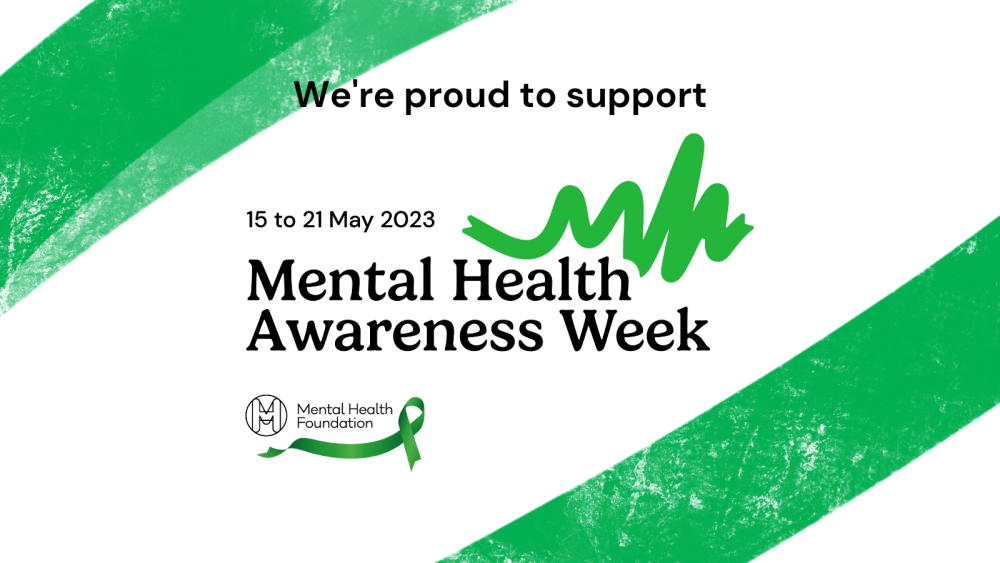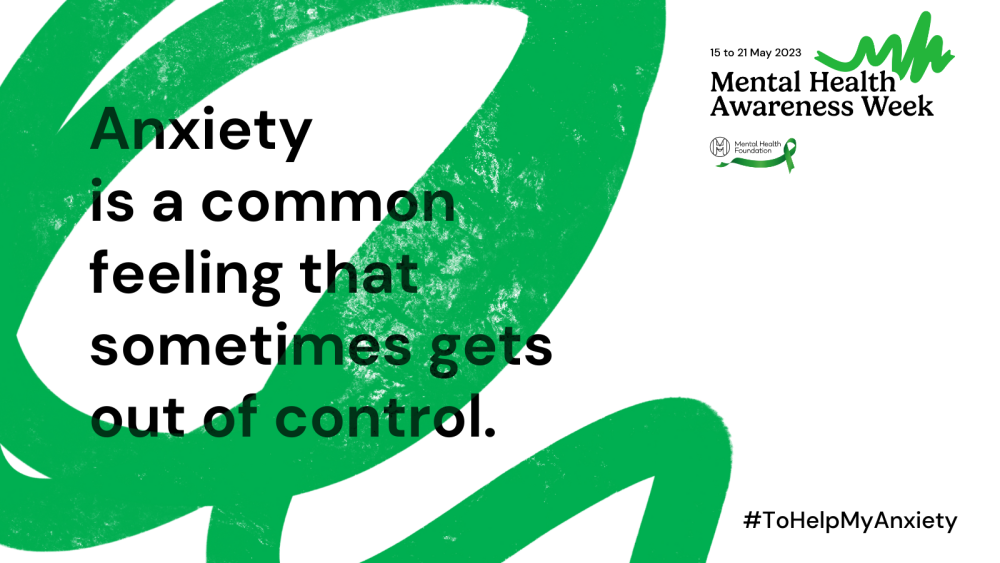CRS supports Mental Health Awareness Week 2023
With this week being Mental Health Awareness Week, we have highlighted the importance of supporting mental health, spoken to some of the team about their own stories and coping mechanisms, and support CRS provides and where to seek professional support and guidance.
What is anxiety and why is it being highlighted during Mental Health Awareness Week?
Anxiety is a normal emotion in us all, but sometimes it can get out of control and become a mental health problem. Lots of things can lead to feelings of anxiety, including exam pressures, relationships, starting a new job (or losing one) or other big life events. We can also get anxious when it comes to things to do with money and not being able to meet our basic needs, like heating our home or buying food. But anxiety can be made easier to manage.

Recent research by Mind found that 56% of people in England and Wales say they have recently experienced a negative mental health effect. Sadly, this isn’t surprising due to the impact of the last couple of years with the pandemic and the cost-of-living crisis, especially with 48% of people saying it has negatively impacted them.
This is why it’s so important to highlight Mental Health Awareness Week. You’re not alone and there is help.
Focusing on anxiety for this year’s Mental Health Awareness Week will increase people’s awareness and understanding of anxiety by providing information on the things that can help prevent it from becoming a problem.
Our teams’ stories
We asked some of our team if they were happy to speak about their own experiences with anxiety and how they have learnt to deal with it. Talking is one of the first steps in addressing mental health issues and paves the way for how we can support each other.

Lynette Robb – Managing Consultant, Compass Associates
How do you look after your mental health?
I’ve had depression and anxiety for over 10 years and I’m constantly learning techniques about how to look after my mental health, both in and out of work. I’ve realised the importance of being in tune with how I’m feeling, whether this is being aware of triggers, allowing myself to prioritise my mental health or knowing when I need to ask for support.
What are your anxiety support mechanisms?
Having a good support system is so important as being able to vocalise how you’re feeling can sometimes be enough to help in that particular situation. I’ve also had Therapists and been through CBT in the past, both of which I found really useful and gave me tools that I still use today. Day-to-day I find small things like going on a dog walk, speaking to/meeting up with friends or practising some self-care helpful.
What advice would give to support someone with anxiety?
I’ve found that it’s a case of trying lots of different techniques, therapy and coping mechanisms, until you find what helps you, as everyone’s mental health and anxiety is unique to them. There’s nothing to be ashamed of and confiding in a friend, colleague, family member or professional can be the start of you putting your support system together.

Ben Cotton – Managing Consultant, Compass Associates
How do you look after your mental health?
I had a consultation with someone years ago, just after my Nan passed away, and the way they explained it to me was that your stress / anxiety limits are like a stack of books. Each book is a percentage of your stress levels; i.e. work 20%, finances 30% etc. And when it reaches the top of the books, the more the chance it has of tipping over the edge – I will always remember that explanation to me.
Breathing techniques worked for me, focusing on hobbies, training etc. In my case, I go to the gym mainly to sort my head out and to release endorphins.
What are your anxiety support mechanisms?
Keeping myself active, trying to eat the best I can when I can, cutting down on alcohol, getting more sleep and surrounding myself around good people.
What advice would give to support someone with anxiety?
Talk, talk, talk. Reach out to a family member, a loved one, or someone you trust first to speak about your issues and how you’re feeling. Afterwards, if you still feel the same, seek professional help because the issues might be long living rather than something that might be bothering you at the present.

Izzy Pearson – Digital Content Specialist, CRS
How do you look after your mental health?
As someone diagnosed with GAD, looking after my mental health is incredibly important to me. I try and keep on top of my mental health by ensuring I have a balanced diet, get a reasonable amount of sleep every night, frequently exercise and make time for my hobbies.
What are your anxiety support mechanisms?
Spending time outdoors and making time for my hobbies that involve physical exercise and limited screen time. Having a good support network around me is also beneficial so I always have someone to talk to if I’m having a bad day. My work team is incredibly supportive of each other if we are feeling anxious or stressed about work or non-work related issues.
What advice would give to support someone with anxiety?
It’s so much easier to give advice to someone when it’s not you dealing with the anxiety at that point in time. However, my best advice is to talk to someone when you can feel your anxiety creeping in, so it doesn’t take hold of the situation. Break the issues you are dealing with down into steps and how you can deal with each step at a time. Attending some of Mind’s workshops and having CBT has been really beneficial for me.

Ashley Davies – Recruitment Consultant, Compass Associates
How do you look after your mental health?
I have had an issue with Anxiety & Depression for years brought on by undiagnosed ADHD and past traumas, Ive found the best way personally to look after my mental health is to not deny it, I take time for myself with exercise and nature walks and rest when needed.
What are your anxiety support mechanisms?
I take medication prescribed by a professional GP but I also take time to exercise, eat healthy, meditate and I take part in Box Breathing and Grounding Exercises most importantly I spend time with my Children
What advice would give to support someone with anxiety?
Don’t give into the Stigma based around Anxiety & Depression, as a man we inherit the teachings of we shouldn’t talk because it makes us weak, this is not true, we need to be more open to talking to a professional or our loved ones about how we are feeling.
How CRS supports mental health
In 2021, CRS introduced mental health first aid training which now sees us have seven in total. We have a new course booked later on this year to add additional Mental Health First Aiders which will reflect the growth of the business. Having mental health first aiders in the workplace is to be a point of contact for an employee who is experiencing a mental health issue.
This interaction could range from having an initial conversation to supporting them to get appropriate help. They are not trained to be therapists, psychiatrists or counsellors, but they can offer initial support through non-judgemental listening and guidance.
Training people in mental health awareness and skills to deal with mental health issues at work helps build an open and supportive culture around mental health which is something we actively encourage at CRS.
We also have our weekly running club that employees to run anywhere between 3km – 8km once a week during work time. This is to help support both being physically active and mental health support.
Sometimes we need to discuss mental health issues in a non-work environment and therefore we provide access to the Health Assured helpline to also support employees.

Further information on mental health support
For further information about Mental Health Awareness Week, visit Mental Health Foundation.
If you’d like to find out more about mental health support, here are some useful sources:
To find out more about our Community & Wellbeing initiatives and for all the latest CRS news, click here.

